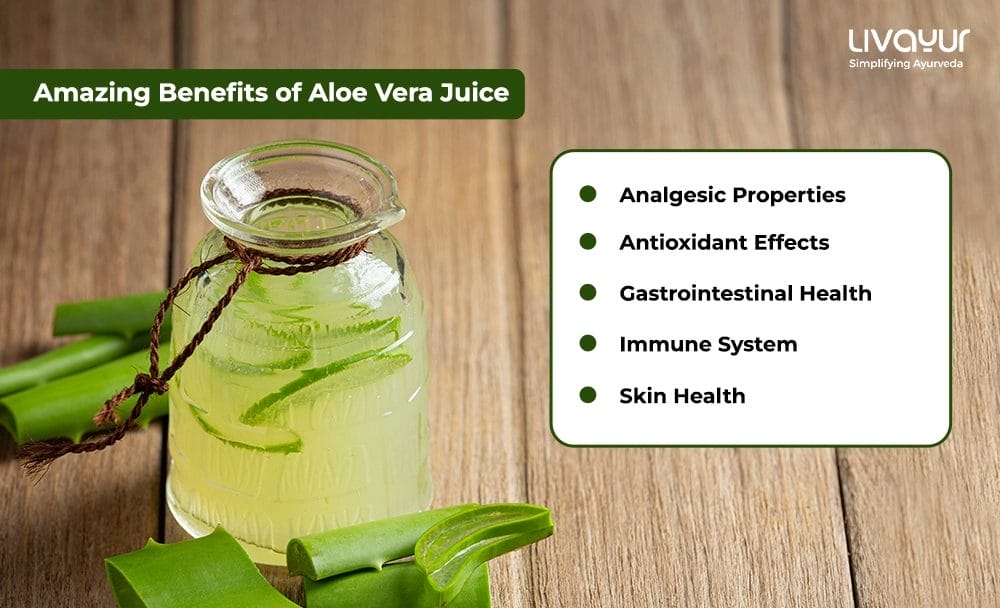This article is reviewed by an expert

Aloe vera, a plant renowned for its medicinal and therapeutic properties, has been celebrated for centuries in several cultures of the world.
But what exactly makes aloe vera so special?
In this article, let’s delve into the incredible benefits of aloe vera juice. From its potential antioxidant effects to its role in promoting digestion and immune function, let’s explore the ways this plant can positively impact your health.
Nutritional Value of Aloe Vera Juice
Aloe vera drink benefits may be attributed to its rich nutritional profile. The table below shows the various nutrients in an 8-ounce serving of aloe vera juice and their values.
| Nutrients | Values |
| Calories | 37 Kcal |
| Sugar | 9.3 g |
| Carbohydrates | 9.3 g |
| Vitamin C | 9.4 mg |
| Sodium | 20 mg |
| Iron | 0.15 mg |
| Calcium | 8 mg |
Aloe Vera Juice Benefits
1. Analgesic Properties (1)
Primary Benefits: Aloe vera contains compounds such as cinnamic acid ester, isobarbaloin, and salicylic acid, which possess analgesic properties.
Secondary Benefits: Furthermore, the enzyme bradykinase found in aloe vera helps stimulate the immune system and acts as an effective analgesic and anti-inflammatory remedy, providing relief from pain and swelling.
2. Antioxidant Effects (1)
Primary Benefits: Aloe vera juice is rich in minerals like manganese and copper, vitamins B2, B6, C, and E, and the amino acid cysteine, which exhibits antioxidant effects.
Secondary Benefits: As such, aloe vera juice helps neutralize free radicals, remove toxins, and reduce oxidative stress.
3. Gastrointestinal Health (1)
Primary Benefits: The glucomannan present in aloe vera acts as a powerful anti-inflammatory, protecting the intestinal wall and reducing protein absorption that may trigger allergic reactions.
Secondary Benefits: In addition, aloe vera juice also helps normalize gastrointestinal function, stimulates intestinal motility, and assists in eliminating allergenic proteins.
4. Immune System (1)
Primary Benefits: Acemannan, a polysaccharide in aloe vera, activates and stimulates immune cells such as macrophages, antibodies, and T-cells.
Secondary Benefits: As a result, aloe vera juice is highly beneficial for combating infections, enhancing cell-mediated immunity, and improving overall immune defense.
5. Skin Health (1)
Primary Benefits: Aloe vera juice provides essential vitamins and minerals that promote proper blood circulation, leading to improved skin hydration, elasticity, and a smoother complexion.
Secondary Benefits: The antioxidants in aloe vera juice also help protect the skin from free radicals, prevent premature aging , and prevent several skin disorders.
6. Antiviral and Antitumor Activity (1)
Primary Benefits: Aloe vera exhibits potent antiviral effects, inhibiting enveloped viruses like herpes simplex, varicella-zoster, and influenza.
Secondary Benefits: Certain compounds, including aloin and polysaccharides, found in aloe vera also contribute to the inhibition of cancer formation and the prevention of tumor growth.
7. Anti-Inflammatory Properties (1)
Primary Benefits: Aloe vera helps inhibit the cyclooxygenase pathway and reduces the production of prostaglandin E2, thereby exerting anti-inflammatory effects.
Secondary Benefits: The presence of C-glucosyl chromone, a novel anti-inflammatory compound, further enhances its anti-inflammatory capabilities.
8. Anti-Diabetic Effect (1)
Primary Benefits: Research indicates that aloe vera can help reduce fasting blood glucose levels, thereby aiding in the management of diabetes.
Secondary Benefits: Additionally, it also helps improve lipid profiles, including cholesterol and triglyceride levels, and increases plasma insulin levels, offering potential benefits for people with diabetes.
9. Anti-Ageing Effects (1)
Primary Benefits: The oligo elements manganese and selenium present in aloe vera can help stimulate the production of powerful antioxidants, slowing down the aging process at a cellular level.
Secondary Benefits: Furthermore, proline, an amino acid found in aloe vera, can contribute to collagen synthesis, enhancing the elasticity and strength of epithelial tissues.
10. Wound Healing (2)
Primary Benefits: Aloe vera is known to aid in the three phases of wound healing: inflammation, tissue removal, and proliferation.
Secondary Benefits: Additionally, aloe vera also increases collagen cross-linking and the synthesis of hyaluronic acid and dermatan sulfate, enhancing wound contraction and breaking strength.
11. Laxative Effects (2)
Primary Benefits: Aloe vera latex, containing anthraquinones like aloin A and B, exhibits potent laxative effects.
Secondary Benefits: As such, these compounds help stimulate mucus secretion, increase intestinal water content, and promote intestinal peristalsis.
12. Oxidative Stress (2)
Primary Benefits: Aloe vera juice plays a significant role in protecting the body from oxidative stress. By reducing cell-damaging processes during stressful conditions, it minimizes biochemical and physiological changes.
Secondary Benefits: Aloe vera also contains antioxidants that help regulate oxidative reactions, both through the body’s natural mechanisms and dietary intake.
Aloe Vera Juice Side Effects (1) (3) (4)
While aloe vera juice may offer benefits, it is important to be aware of potential side effects and contraindications to ensure safe usage.
1. Side effects related to the gastrointestinal tract
Side effects of aloe vera juice include abdominal cramps, diarrhea, red urine, and the possibility of developing dependency or exacerbating constipation. Prolonged use has also been linked to an increased risk of colorectal cancer, and the laxative effect may lead to electrolyte imbalances, particularly low potassium levels.
2. Unsafe for certain groups of people
- Certain people should avoid consuming aloe vera juice, such as people with intestinal obstruction or stenosis, atony, severe dehydration with electrolyte depletion, or chronic constipation.
- Aloe vera juice should also not be used by people with inflammatory intestinal diseases like appendicitis, Crohn’s disease, ulcerative colitis, irritable bowel syndrome, or diverticulitis.
- Patients with cramps, colic, hemorrhoids, nephritis, or any undiagnosed abdominal symptoms such as pain, nausea, or vomiting should also avoid aloe vera juice consumption.
3. Unsafe for children, pregnant women, and lactating mothers
Additionally, it should not be used by children under 10 years of age and during pregnancy or lactation, except under medical supervision after assessing the benefits and risks.
How To Make Aloe Vera Juice (1)?
- Choose a thick and healthy leaf from the outer part of the aloe vera plant.
- Rinse the leaf thoroughly under cold water to remove any dirt or debris.
- Use a sharp knife to carefully peel off the outer green layer of the leaf, exposing the clear gel inside.
- With a spoon, gently scoop out the gel from the leaf and transfer it to a blender or food processor.
- Blend the gel until smooth and consistent.
- For a smoother texture, strain the blended mixture using a fine mesh strainer or cheesecloth.
- Pour the aloe vera juice into a glass and consume it immediately. Any remaining juice can be stored in a refrigerator for a few days.
How to Consume Aloe Vera Juice?
1. As a beverage
You may drink aloe vera juice as a beverage. The juice is mildly bitter. So, if you do not like the taste you may dilute it with some water.
2. As a flavored juice
You may consume aloe vera juice as a flavored drink. You may flavor the juice with juices of fruits or vegetables, with honey, with lemon, etc.
3. As a laxative
If you want to experience the laxative benefits of aloe vera juice, you may consume the juice by mixing it with warm water.
4. As a digestive tonic
If you want to consume the juice as a digestive tonic, you must consume the juice at least 20 to 30 minutes before a meal. This will help soothe the esophagus and your stomach lining, reducing the rate of acid reflux after meals.
FAQs
1. Can aloe vera juice help with weight loss?
Aloe vera juice is not a direct weight loss remedy, but its potential to improve digestion and promote a healthy gastrointestinal system may indirectly support weight management efforts.
2. Is aloe vera juice good for hair?
There are many advantages of aloe vera juice for hair. Applying aloe vera juice on your hair and scalp can help you bid goodbye to hair problems like frizzy hair, dry hair, broken hair cuticles and many more. By incorporating aloe vera juice in your hair care routine you may get smooth textured, healthy hair.
3. Does aloe vera juice interact with medications?
Aloe vera juice can interact with certain medications, such as those for diabetes, heart conditions, and electrolyte imbalances. It’s important to consult a healthcare professional if you’re taking any medications.
4. Can aloe vera juice be used as a substitute for medical treatment?
Aloe vera juice is not a substitute for medical treatment. While it may offer potential health benefits, it should not replace professional medical advice, diagnosis, or treatment.
5. How much aloe vera juice should I consume per day?
It is best to consume 30 ml of aloe juice per day. Do not go beyond that if you want to avoid the side effects. However, it is best to consult a doctor or healthcare expert regarding the exact dosage of aloe vera juice.
Conclusion
The aloe vera juice benefits are truly remarkable. From its analgesic and antioxidant properties to its positive effects on gastrointestinal health, immune function, skin health, antiviral activity, and more, aloe vera juice offers a wide range of potential advantages for your well-being. However, it’s essential to remember that individual experiences may vary, and it’s important to start with a small amount of aloe vera juice to ensure your body tolerates it well. If you experience any adverse reactions, discontinue use and consult with a healthcare professional.
Disclaimer
The information provided here is for general information and not meant to substitute any medical advice. Please consult your doctor for appropriate medical consultation.


















